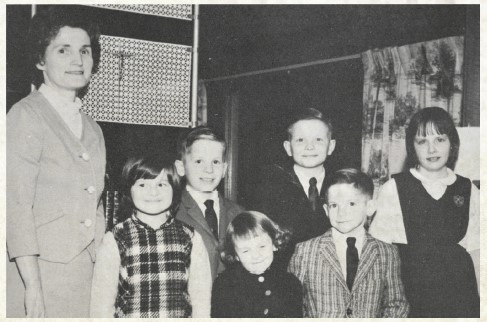
4 minute read
Gleaner’s Orphan Benefit debuted 60 years ago
Over the past 130 years, the Gleaner Society has introduced numerous ways to protect members and their communities. Some innovations — such as the Gleaner Memorial Home or the Gleaner Clearinghouse Association — are memories today, but many others carry on as wonderful ideas that passed the test of time. One example is the Gleaner Orphan Benefit, which was introduced 60 years ago last fall.
“Gleaners rescue their orphans” was the 1964 Forum headline announcing the creation of the Gleaner Orphan Benefit. It was the Society’s 70th birthday, and leaders wanted to help ensure orphans had a brighter future. In cases where both parents were Gleaner benefit members, the new benefit provided a monthly payment to the guardian of the orphaned sons or daughters for care and education. The children also would be eligible to apply for a Gleaner orphan scholarship. (At that time, Gleaner did not offer a scholarship program as it does today.)
The benefit soon began showing its importance, sometimes in dramatic ways. In 1968, the five children of the Van Gilder family of Webberville, Michigan, lost their mother. She was a nurse and contracted a rare virus. Three months later, they lost their father to heart disease. Both parents were Gleaner members. The father, a farmer, had been a third-generation member of the Society.


His sister, Grace and her husband, Delbert A. Cole, brought her five orphaned nephews and nieces to her family’s home and became guardians of the five: John, 11; Janet, 10; Joseph, 8; James, 7; and Barbara Jeanne, 4. A Gleaner member herself, Grace provided periodic updates about the children’s progress. All five of them went on to college and all five earned engineering degrees. They ended up with more than the usual sibling rivalries as John and Janet graduated from the University of Michigan while Joseph, James and Barbara became Michigan State University alumni. When Barbara graduated and the five gathered together, one room was decorated in Michigan’s maize and blue colors, and another room was decorated green and white for Michigan State.
Another prominent case included a Gleaner agent going the extra mile. Three children of the VanZandt family — ages 15, 9, and 6 — qualified through the help of agent Michael Multer. At the time, Multer was a “special representative” for Gleaner based in Coldwater, Michigan. (Today, he is semi-retired and continues to work from South Bend, Indiana.) Multer was asked to distribute the death benefit for the mother, who had died in Florida. After contacting the mother’s relatives, Multer discovered her husband had died five years earlier in a work accident in Michigan. On a hunch, Multer checked whether the children’s father had been a Gleaner member, and the extra work proved important.

“I started with Gleaner and their programs in 1993 and I came from a large company,” Multer recently recalled. “They didn’t have these types of programs that — even if they wanted to — an agent could get involved in like orphan benefits and scholarships and things like that. I did a lot of things that I never did at the larger companies.”
Multer was able to facilitate Orphan Benefit payments to the VanZandt children’s aunt and uncle who were raising them in Big Rapids, Michigan.
“I kept asking myself, ‘Is this guy really an insurance salesman?’ He’s talking about giving money away when usually they talk about collecting premium,” the uncle, John Sullivan, recalled at the time. “I said to myself, ‘Man, this guy is different.’”
Fortunately, the Orphan Benefit has not been widely needed, but it continues to provide peace of mind to Gleaner parents. The benefit still offers payment to the qualified guardian for the orphaned child through 18 years of age, and then provides payments of up to $2,500 per year for four years of college. Nothing can fully replace a father and a mother, but Gleaner Life Insurance Society has proven its commitment to protecting members’ children so they can grow into strong adults.










